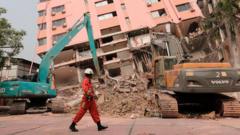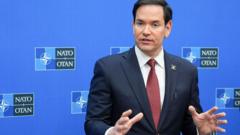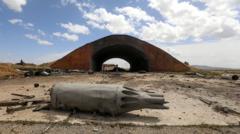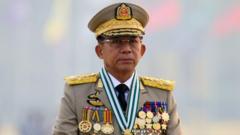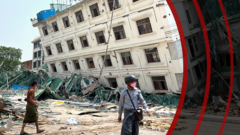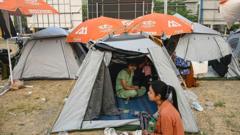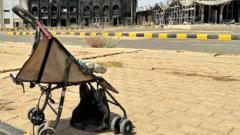Henry Hamra, a Syrian Jew, has embarked on a significant mission to advocate for Syria’s new governance while returning to his homeland after years of exile.
**Jewish Community Seeks Sanctions Relief for New Syrian Government**

**Jewish Community Seeks Sanctions Relief for New Syrian Government**
Amidst the aftermath of Syria's civil war, a group of Syrian Jews advocates for lifting sanctions on their homeland, challenging the skepticism of many Jewish organizations.
In February, Henry Hamra and his father, Rabbi Yosef Hamra, returned to their ancestral Syria after more than three decades away, inspired by the hopes for renewal following the fall of the Assad regime. After the tumult of civil war, Mr. Hamra, a prominent Brooklyn resident, shared the profound longing he felt to reconnect with Syria’s ancient Jewish heritage. However, his heart sank upon witnessing the deterioration of historical sites, including the once-thriving Jobar synagogue, ravaged by years of conflict and neglect due to economic sanctions by the United States.
Mr. Hamra’s emotional journey was marked by both sorrow and a sense of possibility. He was joined by other members of the diaspora who also wish to see their homeland healed. Together, they engaged with U.S. lawmakers to argue for lifting some of the restrictive financial measures that have crippled Syria's economy post-war.
In meetings with congressional representatives, Mr. Hamra emphasized the crippling effects of the sanctions on Syria’s reconstruction efforts. “There’s a lot of work that has to be done, and I think the only thing that’s stopping the whole thing is the sanctions,” he remarked during a discussion with Representative Jimmy Panetta.
Yet, their advocacy does not come without controversy. Many Jewish organizations, including the American Israel Public Affairs Committee, remain cautious, stating that any adjustments to U.S. policy must be grounded in a consistent demonstration of positive actions by the new leadership. The Hamra family, leveraging their ties with Syrian American advocacy groups, has presented a nuanced perspective as they navigate the complexities of regional politics and their personal heritage.
The future of Syria’s recovery remains uncertain, and the push for sanctions relief highlights broader discussions about the reconciliation of its fractured society and the hopes of its diaspora.
Mr. Hamra’s emotional journey was marked by both sorrow and a sense of possibility. He was joined by other members of the diaspora who also wish to see their homeland healed. Together, they engaged with U.S. lawmakers to argue for lifting some of the restrictive financial measures that have crippled Syria's economy post-war.
In meetings with congressional representatives, Mr. Hamra emphasized the crippling effects of the sanctions on Syria’s reconstruction efforts. “There’s a lot of work that has to be done, and I think the only thing that’s stopping the whole thing is the sanctions,” he remarked during a discussion with Representative Jimmy Panetta.
Yet, their advocacy does not come without controversy. Many Jewish organizations, including the American Israel Public Affairs Committee, remain cautious, stating that any adjustments to U.S. policy must be grounded in a consistent demonstration of positive actions by the new leadership. The Hamra family, leveraging their ties with Syrian American advocacy groups, has presented a nuanced perspective as they navigate the complexities of regional politics and their personal heritage.
The future of Syria’s recovery remains uncertain, and the push for sanctions relief highlights broader discussions about the reconciliation of its fractured society and the hopes of its diaspora.



